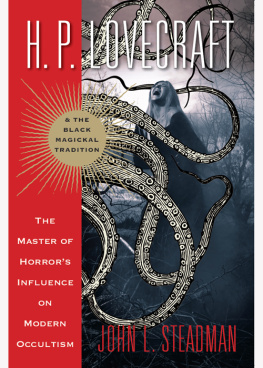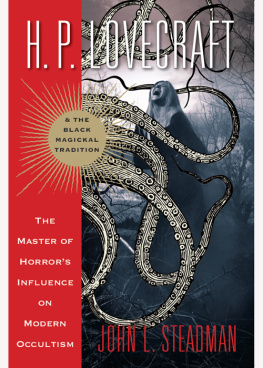Howard Lovecraft - The Other Gods
Here you can read online Howard Lovecraft - The Other Gods full text of the book (entire story) in english for free. Download pdf and epub, get meaning, cover and reviews about this ebook. genre: Science fiction. Description of the work, (preface) as well as reviews are available. Best literature library LitArk.com created for fans of good reading and offers a wide selection of genres:
Romance novel
Science fiction
Adventure
Detective
Science
History
Home and family
Prose
Art
Politics
Computer
Non-fiction
Religion
Business
Children
Humor
Choose a favorite category and find really read worthwhile books. Enjoy immersion in the world of imagination, feel the emotions of the characters or learn something new for yourself, make an fascinating discovery.

- Book:The Other Gods
- Author:
- Genre:
- Rating:5 / 5
- Favourites:Add to favourites
- Your mark:
- 100
- 1
- 2
- 3
- 4
- 5
The Other Gods: summary, description and annotation
We offer to read an annotation, description, summary or preface (depends on what the author of the book "The Other Gods" wrote himself). If you haven't found the necessary information about the book — write in the comments, we will try to find it.
The Other Gods — read online for free the complete book (whole text) full work
Below is the text of the book, divided by pages. System saving the place of the last page read, allows you to conveniently read the book "The Other Gods" online for free, without having to search again every time where you left off. Put a bookmark, and you can go to the page where you finished reading at any time.
Font size:
Interval:
Bookmark:
The Other Gods
by Edgar Allan Poe
Atop the tallest of earth's peaks dwell the gods of earth, and suffer not man to tell that he hath looked upon them. Lesser peaks they once inhabited; but ever the men from the plains would scale the slopes of rock and snow, driving the gods to higher and higher mountains till now only the last remains. When they left their old peaks they took with them all signs of themselves, save once, it is said, when they left a carven image on the face of the mountain which they called Ngranek.
But now they have betaken themselves to unknown Kadath in the cold waste where no man treads, and are grown stern, having no higher peak whereto to flee at the coming of men. They are grown stern, and where once they suffered men to displace them, they now forbid men to come; or coming, to depart. It is well for men that they know not of Kadath in the cold waste; else they would seek injudiciously to scale it.
Sometimes when earth's gods are homesick they visit in the still of the night the peaks where once they dwelt, and weep softly as they try to play in the olden way on remembered slopes. Men have felt the tears of the gods on white-capped Thurai, though they have thought it rain; and have heard the sighs of the gods in the plaintive dawn-winds of Lerion. In cloud-ships the gods are wont to travel, and wise cotters have legends that keep them from certain high peaks at night when it is cloudy, for the gods are not lenient as of old.
In Ulthar, which lies beyond the river Skai, once dwelt an old man avid to behold the gods of earth; a man deeply learned in the seven cryptical books of earth, and familiar with the Pnakotic Manuscripts of distant and frozen Lomar. His name was Barzai the Wise, and the villagers tell of how he went up a mountain on the night of the strange eclipse.
Barzai knew so much of the gods that he could tell of their comings and goings, and guessed so many of their secrets that he was deemed half a god himself. It was he who wisely advised the burgesses of Ulthar when they passed their remarkable law against the slaying of cats, and who first told the young priest Atal where it is that black cats go at midnight on St. John's Eve. Barzai was learned in the lore of the earth's gods, and had gained a desire to look upon their faces. He believed that his great secret knowledge of gods could shield him from their wrath, so resolved to go up to the summit of high and rocky Hatheg-Kla on a night when he knew the gods would be there.
Hatheg-Kla is far in the stony desert beyond Hatheg, for which it is named, and rises like a rock statue in a silent temple. Around its peak the mists play always mournfully, for mists are the memories of the gods, and the gods loved Hatheg-Kla when they dwelt upon it in the old days. Often the gods of earth visit Hatheg-Kla in their ships of clouds, casting pale vapors over the slopes as they dance reminiscently on the summit under a clear moon. The villagers of Hatheg say it is ill to climb the Hatheg-Kla at any time, and deadly to climb it by night when pale vapors hide the summit and the moon; but Barzai heeded them not when he came from neighboring Ulthar with the young priest Atal, who was his disciple. Atal was only the son of an innkeeper, and was sometimes afraid; but Barzai's father had been a landgrave who dwelt in an ancient castle, so he had no common superstition in his blood, and only laughed at the fearful cotters.
Barzai and Atal went out of Hatheg into the stony desert despite the prayers of peasants, and talked of earth's gods by their campfires at night. Many days they traveled, and from afar saw lofty Hatheg-Kla with his aureole of mournful mist. On the thirteenth day they reached the mountain's lonely base, and Atal spoke of his fears. But Barzai was old and learned and had no fears, so led the way up the slope that no man had scaled since the time of Sansu, who is written of with fright in the moldy Pnakotic Manuscripts.
The way was rocky, and made perilous by chasms, cliffs, and falling stones. Later it grew cold and snowy; and Barzai and Atal often slipped and fell as they hewed and plodded upward with staves and axes. Finally the air grew thin, and the sky changed color, and the climbers found it hard to breathe; but still they toiled up and up, marveling at the strangeness of the scene and thrilling at the thought of what would happen on the summit when the moon was out and the pale vapours spread around. For three days they climbed higher and higher toward the roof of the world; then they camped to wait for the clouding of the moon.
For four nights no clouds came, and the moon shone down cold through the thin mournful mist around the silent pinnacle. Then on the fifth night, which was the night of the full moon, Barzai saw some dense clouds far to the north, and stayed up with Atal to watch them draw near. Thick and majestic they sailed, slowly and deliberately onward; ranging themselves round the peak high above the watchers, and hiding the moon and the summit from view. For a long hour the watchers gazed, whilst the vapours swirled and the screen of clouds grew thicker and more restless. Barzai was wise in the lore of earth's gods, and listened hard for certain sounds, but Atal felt the chill of the vapours and the awe of the night, and feared much. And when Barzai began to climb higher and beckon eagerly, it was long before Atal would follow.
So thick were the vapours that the way was hard, and though Atal followed at last, he could scarce see the gray shape of Barzai on the dim slope above in the clouded moonlight. Barzai forged very far ahead, and seemed despite his age to climb more easily than Atal; fearing not the steepness that began to grow too great for any save a strong and dauntless man, nor pausing at wide black chasms that Atal could scarce leap. And so they went up wildly over rocks and gulfs, slipping and stumbling, and sometimes awed at the vastness and horrible silence of bleak ice pinnacles and mute granite steeps.
Very suddenly Barzai went out of Atal's sight, scaling a hideous cliff that seemed to bulge outward and block the path for any climber not inspired of earth's gods. Atal was far below, and planning what he should do when he reached the place, when curiously he noticed that the light had grown strong, as if the cloudless peak and moonlit meetingplace of the gods were very near. And as he scrambled on toward the bulging cliff and litten sky he felt fears more shocking than any he had known before. Then through the high mists he heard the voice of Barzai shouting wildly in delight:
"I have heard the gods. I have heard earth's gods singing in revelry on Hatheg-Kla! The voices of earth's gods are known to Barzai the Prophet! The mists are thin and the moon is bright, and I shall see the gods dancing wildly on Hatheg-Kla that they loved in youth. The wisdom of Barzai hath made him greater than earth's gods, and against his will their spells and barriers are as naught; Barzai will behold the gods, the proud gods, the secret gods, the gods of earth who spurn the sight of man!"
Atal could not hear the voices Barzai heard, but he was now close to the bulging cliff and scanning it for footholds. Then he heard Barzai's voice grow shriller and louder:
"The mist is very thin, and the moon casts shadows on the slope; the voices of earth's gods are high and wild, and they fear the coming of Barzai the Wise, who is greater than they The moon's light flickers, as earth's gods dance against it; I shall see the dancing forms of the gods that leap and howl in the moonlight The light is dimmer and the gods are afraid"
Whilst Barzai was shouting these things Atal felt a spectral change in all the air, as if the laws of earth were bowing to greater laws; for though the way was steeper than ever, the upward path was now grown fearsomely easy, and the bulging cliff proved scarce an obstacle when he reached it and slid perilously up its convex face. The light of the moon had strangely failed, and as Atal plunged upward through the mists he heard Barzai the Wise shrieking in the shadows:
Font size:
Interval:
Bookmark:
Similar books «The Other Gods»
Look at similar books to The Other Gods. We have selected literature similar in name and meaning in the hope of providing readers with more options to find new, interesting, not yet read works.
Discussion, reviews of the book The Other Gods and just readers' own opinions. Leave your comments, write what you think about the work, its meaning or the main characters. Specify what exactly you liked and what you didn't like, and why you think so.



